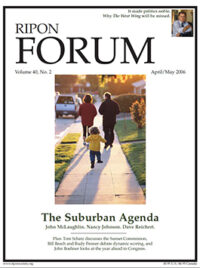
There are two basic truths to mid-term elections in America – they are won on themes, and, historically speaking at least, they are usually lost by the party in power.
In the mid-terms of 1994, the elections were about the corruption of the Democrat-controlled Congress and the failed attempt by the Clinton Administration to establish a socialized health care system.
In 1998, the elections were about President Clinton’s impeachment, and the belief among many voters that the Republican majority in Congress had overreached and was ignoring other important issues in its drive to hold the President accountable.
In 2002, the elections were about the September 11th terrorist attacks, and the belief that our country – led by President Bush and a Republican-controlled House — needed to do everything possible to keep the American people and our homeland secure.
In the first two cases, the party in power either lost seats in Congress (Republicans in 1998) or lost control of Congress altogether (Democrats in 1994). In the 2002 elections, Republicans defied history and actually gained seats. But if Republicans proved the exception to the rule in 2002, it was because 2002 was an exceptional year; the elections were held in the shadow of 9/11, with the memory of that awful day still fresh in voters’ minds.
As we approach the five year anniversary of the terrorist attacks, one thing should be clear: political partisanship has returned to America, which means the basic truth of the 2006 elections will be that the Republican majority is likely to lose seats in November – unless, of course, they do something about it by putting forward a positive agenda that will help them win seats instead.
One member of Congress who is playing a key role in doing just that is Republican Representative Mark Kirk of Illinois. Congressman Kirk is the leader of a group of just over 20 members of the House of Representatives who are working on an agenda geared around the lives of people who reside in America’s suburbs.
Why the suburbs?
Over the past few decades, suburban voters have usually been a key to Republican victories. However, in more recent elections, they have gone from being a bastion of electoral success to a political battleground where previously reliable GOP votes are now up for grabs.
As part of the effort to craft a suburban agenda, Congressman Kirk commissioned a national poll among 1,000 likely suburban voters between January 24 and 26, 2006, to learn more about the issues that are important to them and their views on the election this year. These suburban voters were chosen from predetermined suburban counties across the nation in targeted Congressional districts. For Republicans, the results reveal not only the challenges that lie ahead, but the opportunities, as well.
The challenges lie in the numbers. On the generic vote for Congress, for example, Democrats are leading 36 percent to 33 percent. There is also a pronounced gender gap among suburban voters, with men supporting Republicans for Congress by a margin of 37 percent to 33 percent, and women supporting Democrats by a margin of 39 percent to 29 percent. Two other segments of concern are independent voters, who are 62 percent undecided with a plurality favoring Democrats, and suburban pro-choice women, who prefer Democrats for Congress by a margin of 50 percent to 19 percent.
Among all suburban voters, 56 percent believe the country is heading down the wrong track, while only 32 percent see it headed in the right direction. Generally speaking, if suburban voters say America is on the wrong track, they will vote Democrat by a margin of 56 percent to 14 percent. A lot of this has to do with perceptions about the war in Iraq. A plurality of suburban voters — 40 percent, to be exact — believes that America is losing the war. Even more distressing is the fact that among those who are undecided in their choice for Congress, only 26 percent say America is winning the war, while 34 percent think we are losing.
Moving beyond the numbers.
Clearly, this survey confirms that Republicans face a real challenge in winning over suburban voters in 2006. It also confirms that just as homeland security was on the minds of American voters in 2002, the war in Iraq is on the minds of many suburban voters today. But beyond these numbers and beyond this one issue, the survey reveals one other key thing – mainly, that the GOP can win the suburban vote if it puts forward a plan that makes a difference in people’s daily lives.
Over the past few decades, suburban voters have usually been a key to Republican victories. However, in more recent elections, they have gone from being a bastion of electoral success to a political battleground where previously reliable GOP votes are now up for grabs.
The agenda being developed by Congressman Kirk and the other members of the suburban caucus would achieve that goal. In fact, the survey revealed that the issues and ideas being developed as part of the Suburban Agenda have a real resonance among voters in suburban America. These issues and ideas, and the response they received in the survey, include:
Helping small businesses provide health coverage for their employees — 92 percent of those surveyed favor providing tax credits to small business owners who provide health insurance for their employees.
Making sure our kids are secure in the classroom — 89 percent favor passing a school safety bill, permitting federal background checks on new teachers to prevent criminals or pedophiles from being hired. Only 7 percent opposed such background checks as an invasion of privacy.
Making sure our kids are secure online — 87 percent favor requiring schools and libraries to install internet filters to protect children from child pornography and Internet predators. Only 9 percent thought that this proposal violated free speech.
Keeping drugs and firearms out of schools — 86 percent favor allowing school officials to check their students’ lockers for illegal drugs or weapons without the permission of the student. Only 11 percent felt this would invade the privacy rights of students.
Making sure people don’t lose their health care when they change jobs — 84 percent favor requiring health insurance plans to be portable so that when people change jobs, they do not lose their insurance. Only 9 percent thought this would be too burdensome a federal regulation.
Helping parents plan for their kids’ future — 84 percent favor establishing what is being called a “401 KIDS tax” deferred savings account plan to give parents the ability to establish tax free savings accounts for their children.
Making sure teachers are qualified — 83 percent favor requiring teachers to pass a periodic competency test to ensure they are current in their subject matter. Only 13 percent opposed this idea because it increases demands on teachers’ time and attention.
Strengthening personal property rights — 81 percent favor protecting homeowners’ property rights by limiting the ability of local governments to seize property for the purpose of private development. Only 15 percent would allow seizing property for private development with compensation.
Making sure attorneys can’t take advantage of Superfund legal fees — 80 percent favor limiting the Environmental Superfund legal fees to 10 percent so that 90 percent of the fund is spent on restoration. Only 11 percent would not limit time and cost.
Helping people buy their first house — 75 percent favor a $5,000 tax credit for first time home buyers to make home ownership more affordable.
Helping people save for when they get sick – 73 percent favor allowing a person to set aside money, free from taxes, in a Medical Savings Account to be used to pay medical bills and insurance premiums. Only 16 percent would permit Americans to only use state regulated and approved insurance plans.
Keeping driver’s licenses out of illegal immigrants’ hands — 73 percent favor prohibiting states from issuing driver’s licenses to illegal immigrants. Only 19 percent thought giving undocumented workers driver’s licenses would encourage more car insurance and driver testing.
Keeping gangs out of schools — 70 percent favor increasing federal funding to fight against gangs in schools who are linked to international drug cartels. Only 21 percent thought this was an unnecessary expansion into local police jurisdiction.
Encouraging people to conserve land — 69 percent favor federal tax incentives to individuals and businesses for donating their privately owned open space for environmental conservation.
Putting an end to frivolous lawsuits — 68 percent favor stopping frivolous lawsuits against doctors by capping medical malpractice awards at $250,000 in economic damages. Only 26 percent would give patients unlimited rights to sue their doctor or hospital.
Improving electronic medical record keeping — 61 percent favor setting a federal date for all doctors and hospitals to keep electronic medical records. Only 26 percent opposed it because it would be easier to invade private medical records.
Helping parents save for college — 61 percent favor providing parents with a $1,000 educational tax credit to be used for their child’s educational expenses. Only 32 percent preferred increasing federal spending on government programs to assist public schools over the tax credit.
The consensus for these issues is so broad and so wide, that they can certainly attract support from a majority of suburban voters. Nine of these issues poll over 80 percent support. Another eight issues receive an over 60 percent majority. If political strategy is based upon significant public opinion numbers, it would be hard to develop a more popular agenda.
The real challenge, of course, will be to make progress on these issues before November. Time is running short. Work needs to begin immediately to get this done. Legislation needs to be strategically introduced in the House in the spring and early summer, and then promoted by the membership when they return to their districts for their August work period. Likewise, Republicans also need to craft a comprehensive communications strategy to sell this plan for what it is – a positive effort to make government work.
Implemented successfully, the Democrat opposition will have only two real choices: 1) adopt and pass this legislation, which will give the Republican majority real accomplishments to point to in the election; or, 2) fight a losing battle against this agenda, which in turn will give the GOP important contrast issues in November.
For Republicans, it’s a win-win proposition either way, which is why the Suburban Agenda is not only the kind of plan parties win elections with, but the kind of plan parties in power need to retain and build upon their majority.
John McLaughlin is the CEO of McLaughlin and Associates.




